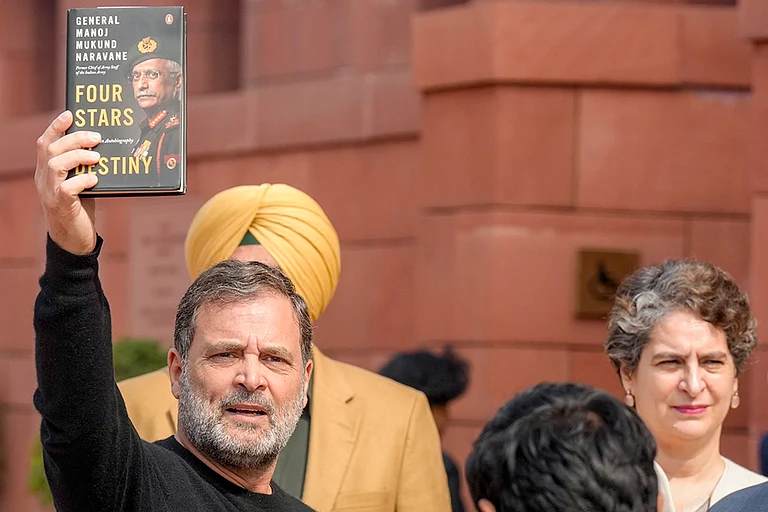Parliament's standing committees were formed on Thursday with BJP's Bharturhari Mahtab being picked as the chair of the key panel on Finance and Shashi Tharoor on External Affairs.
These department-wise standing committees -- with members from across several parties -- act as a mini parliament, ensuring that all the various ministries are functioning properly.
A communique from the Rajya Sabha Secretariat was issued to announce the committees.
With former Union Minister Radha Mohan Singh as the chair, the Leader of Opposition in Lok Sabha Rahul Gandhi is also named a part of the Defence Committee.
BJP member Radha Mohan Das Agrawal will head the panel on Home Affairs. Meanwhile, the Committee on Communications and Information Technology will be chaired by BJP leader Nishikant Dubey and party MP Kangana Ranaut is reportedly appointed as a member on the panel.
Notably, in 2022, Dubey was in a tiff with Tharoor who was the chair on the panel of Committee and IT. However, Tharoor was later replaced as the chair of the key committee.
Former Union Minister Anurag Thakur will be heading the Committee on Coal, Mines and Steel, while Rajiv Pratap Rudy will chair the Water Resources panel.
Congress leaders Charanjit Singh Channi and Saptagiri Ulaka have been given the chairmanships of the panels on Agriculture, Animal Husbandry and Food Processing; and Rural Development and Panchayati Raj respectively.
Dravida Munnetra Kazhagam (DMK) leader Tiruchi Siva will head the Committee on Industry, while his party colleague Kanimozhi will chair the panel on Consumer Affairs, Food and Public Distribution respectively.
The Bharatiya Janata Party's key allies like the Telugu Desam Party (TDP) and Janata Dal (United) other than its Maharashtra poll partners -- Shiv Sena and Nationalist Congress Party (NCP), will also head one committee each.
Nationalist Congress Party's (NCP) lone Lok Sabha member Sunil Tatkare has been appointed as the chairman of the committee on Petroleum and Natural Gas. And Shiv Sena's Shrirang Appa Barne will lead the Committee on Energy.
JD(U)'s Sanjay Jha will be the chair of Transport, Tourism and Culture panel while TDP's Manguta Sreenivasulu Reddy will helm the committee on Housing and Urban Affairs.
The Committee on Health will be chaired by SP leader Ram Gopal Yadav while that of Commerce will be led by Trinamool Congress (TMC) leader Dola Sen, and Chemicals and Fertilisers by TMC's Kirti Azad.
BJP leader Brij Lal, former director general of the Uttar Pradesh police, will lead the panel on Personnel, Public, Grievances, Law and Justice. The members of this panel include former Chief Justice of India Ranjan Gogoi and Bar Council of India Chairman Manan Mishra.
The Committee on Science and Technology, Environment, Forests and Climate Change will be led by BJP's Bhubaneswar Kalita, while that on Labour will be chaired by Basavaraj Bommai.
BJP's PC Mohan will helm the committee on Social Justice and Empowerment, while CM Ramesh will lead the panel on Railways.
Of the 24 department-related parliamentary committees, the BJP has the chairmanship of 11, while its allies have got four panels to lead. Congress leaders sit at the chair of four panels, followed by two each by DMK and Trinamool Congress, and one by Samajwadi Party.
What Are They? What Do They Do?
According to the definition provided by the Parliament, these standing committees deal with the business transacted to it from the Parliament. This is because both the Houses have a limited amount of time and considerable volume of work.
"Parliamentary Committee means a committee which is appointed or elected by the House or nominated by the Speaker and which works under the direction of the Speaker and presents its report to the House or to the Speaker and Secretariat for which is provided by the Lok Sabha Secretariat," it says.
There are two kinds of Parliamentary Committees: Standing and Ad hoc.
By nature and definition, "Standing Committees are permanent and regular committees which are constituted from time to time in pursuance of the provisions of an Act of Parliament or Rules of Procedure and Conduct of Business in Lok Sabha. The work of these Committees is of continuous nature. The Financial Committees, DRSCs and some other Committees come under the category of Standing Committees."
Functions Of The Standing Committee:
Each Standing Committee, till the 13th Lok Sabha, consisted of not more than 45 members to 30 to be nominated by the Speaker from amongst the members of Lok Sabha and 15 to be nominated by the Rajya Sabha Chairman. But, with restructuring of Departmentally Related Standing Committees in July, 2004, each panel has 31 members including 21 from the Lower House and 10 from the Upper House.
These committees' functions are:
Consideration of Demands for Grants
Examination of Bills referred to by the Rajya Sabha Chairman and Lok Sabha Speaker as the case may be
Consideration of Annual Reports
Consideration of national basic long term policy documents presented to the Houses and referred to the Committee by the Rajya Sabha Chairman or the Lok Sabha Speaker as the case may be and make reports thereon.
Notably, these committees do not consider day-to-day administration matters of the concerned ministries or departments.
With the emphasis of the DRSCs' functioning "to concentrate on long-term plans, policies guiding the working of the Executive, these Committees are providing necessary direction, guidance, and inputs for broad policy formulations and in achievement of the long-term national perspective by the Executive."









.png?auto=format%2Ccompress&fit=max&format=webp&w=768&dpr=1.0)
















